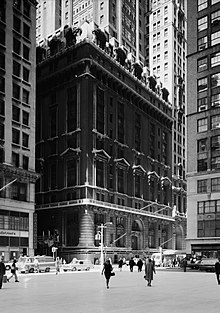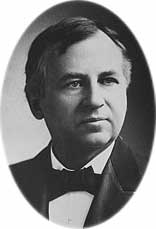John Wanamaker
John Wanamaker (born July 11, 1838 in Philadelphia , Pennsylvania , † December 12, 1922 there ) was an American businessman . He is considered the father of modern advertising . From 1889 to 1893 he was the 35th US Postal Secretary .
Early years
John Wanamaker attended Landreth Public School in Philadelphia until 1852. He moved to Indiana with his family soon after , but they returned to Philadelphia in 1856 and he was employed by a clothing store. The young wanamaker was very ambitious and soon moved to higher paying positions in the same industry. His goal was to become a wealthy businessman. Wanamaker also joined the Christian Association Young People (YMCA) (Engl. Young Men's Christian Association , YMCA) and became active as its secretary. He would remain associated with this organization for the rest of his life. When the American Civil War broke out , he wanted to join the army, but was turned down for health reasons. Instead, he founded the so-called Christian Commission, which looked after wounded soldiers on both sides.
Business advancement

In addition to these activities, Wanamaker opened his own, still small clothing store in Philadelphia on April 8, 1861. The business developed rather slowly at first, but within a few years it became the largest business of its kind in the United States . Wanamaker introduced new advertising methods and for the first time offered the option of returning goods with a simultaneous price refund. In 1875 he added another sales point to his business. He offered more and more clothing and then other household goods. He divided his shops into different departments. This gave rise to the term “department store”. Soon Wanamaker became one of the leading merchants in the US, if not the world. Over the years he expanded his business to more and more cities. In 1896 he opened his first store in New York City .
When Searchmont Motor Company , an automobile manufacturer from Philadelphia, ran into financial difficulties in 1903, John Wanamaker took over the entire new car inventory of around 100 copies. With a list price between US $ 2000 and 2250, he only paid US $ 750 each and easily sold them in his Philadelphia and New York City offices for US $ 1200. Charles Yale Knight bought one of these cars and later fitted it with the first of his own design of valve motors. At the beginning of the 20th century, these two department stores also had automobile dealerships for Studebaker , Cadillac and the French De Dion-Bouton .
He soon ventured to Europe , where he also opened stores in London and Paris . Wanamaker owed its rise on the one hand to its ambition and energy, on the other hand to its advertising concept. Its employees were enjoying benefits such as health care, pension rights, and profit-sharing long before they became common practice.
In 1909, John Wanamaker purchased an organ that had previously been built for the Louisiana Purchase Exposition . He had this organ installed in the Grand Court of his new shop in Philadelphia, where it was expanded several times and is now the largest playable organ in the world. The organ is known as the Wanamaker Organ , see Wanamaker Department Store Organ (Philadelphia) . He had a Welte Philharmonic organ built into his private home .
United States Postal Secretary
In 1889, President Benjamin Harrison named Wanamaker as the new Secretary of the Post Office of the United States. In this capacity he enforced a law in 1890 that prohibited the postal delivery of lottery tickets. That meant the practical end for the then often corrupt state lottery companies. However, some of his decisions were controversial. During his four-year term in office, around 30,000 postal workers were fired and replaced by partisans (spoil system). The close cooperation between the Ministry of Post and the Wanamaker business empire was also controversial.
Another résumé
After serving as Minister of Post, he continued his business career. At the time of his death, his fortune was valued at over $ 100 million, a tremendous sum for the time. This fortune was divided among the three surviving children after his death. In 1912, Wanamaker was a delegate to the Republican National Convention . At that time he was being discussed as a candidate for the vice presidency. Wanamaker also supported church parishes, social institutions and schools.
Individual evidence
- ↑ Kimes / Clark: Standard Catalog of American Cars 1805-1942 (1985), pp. 1289 and 1464
- ^ Kimes / Clark: Standard Catalog of American Cars 1805-1942 (1985), p. 1464
- ↑ List of Philharmonic Organs by M. Welte & Sons and M. Welte & Sons
literature
- Beverly Rae Kimes (Editor), Henry Austin Clark Jr.: The Standard Catalog of American Cars 1805–1942. 2nd Edition. Krause Publications, Iola WI 1985, ISBN 0-87341-111-0 . (English)
Web links
- John Wanamaker, Philadelphia , departmentstoremuseum.blogspot.ch, (accessed May 20, 2013)
- Macy's Tourism Marketing and Development , visitmacysphiladelphia.com, (accessed May 20, 2013)
- Philadelphia - Wanamaker's Department Store Archeology , retroroadmap.com, (accessed May 20, 2013)
- Biography of John Wanamaker , wanamakerorgan.com, (accessed May 20, 2013)
- John Wanamaker in the Miller Center of Public Affairs of the University of Virginia (English)
- Newspaper article about John Wanamaker in the 20th century press kit of the ZBW - Leibniz Information Center for Economics .
- John Wanamaker in the database of Find a Grave (English)
| personal data | |
|---|---|
| SURNAME | Wanamaker, John |
| BRIEF DESCRIPTION | American merchant and religious leader |
| DATE OF BIRTH | July 11, 1838 |
| PLACE OF BIRTH | Philadelphia |
| DATE OF DEATH | December 12, 1922 |
| Place of death | Philadelphia |

